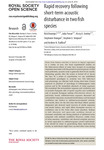Please use this identifier to cite or link to this item:
http://lib.hpu.edu.vn/handle/123456789/21878Full metadata record
| DC Field | Value | Language |
|---|---|---|
| dc.contributor.author | Bruintjes, Rick | en_US |
| dc.contributor.author | Purser, Julia | en_US |
| dc.contributor.author | Everley, Kirsty A. | en_US |
| dc.date.accessioned | 2016-07-04T03:49:00Z | |
| dc.date.available | 2016-07-04T03:49:00Z | |
| dc.date.issued | 2016 | en_US |
| dc.identifier.other | HPU4160363 | en_US |
| dc.identifier.uri | https://lib.hpu.edu.vn/handle/123456789/21878 | en_US |
| dc.description.abstract | Noise from human activities is known to impact organisms in a variety of taxa, but most experimental studies on the behavioural effects of noise have focused on examining responses associated with the period of actual exposure. Unlike most pollutants, acoustic noise is generally short-lived, usually dissipating quickly after the source is turned off or leaves the area. | en_US |
| dc.format.extent | 19 p. | en_US |
| dc.format.mimetype | application/pdf | en_US |
| dc.language.iso | en | en_US |
| dc.subject | Biology | en_US |
| dc.subject | Behaviour | en_US |
| dc.subject | Environmental science | en_US |
| dc.subject | Ecology | en_US |
| dc.subject | Anthropogenic noise | en_US |
| dc.subject | Behaviour | en_US |
| dc.subject | Residual | en_US |
| dc.subject | Physiology | en_US |
| dc.subject | Environmental pollutant | en_US |
| dc.title | Rapid recovery following short termacoustic disturbance in two fish species | en_US |
| dc.type | Article | en_US |
| dc.size | 738KB | en_US |
| dc.department | Education | en_US |
| Appears in Collections: | Education | |
Files in This Item:
| File | Description | Size | Format | |
|---|---|---|---|---|
| 0246_Rapidrecoveryfollowing.pdf Restricted Access | 738.06 kB | Adobe PDF |  View/Open Request a copy |
Items in DSpace are protected by copyright, with all rights reserved, unless otherwise indicated.
